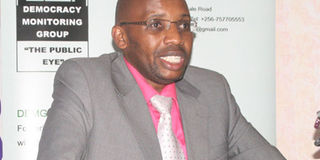Register has 140,000 dead voters - report

UNEARTHED: Mr Ssentamu addresses journalists in Kampala yesterday. PHOTO BY YUSUF MUZIRANSA
The National Voters Register to be used for tomorrow’s presidential and parliamentary elections likely contains 139,541 dead persons, more than half a million “unknown people” and 1.9 million voters who have since changed location, a new report shows.
The Electoral Commission, however, said the highlighted anomalies, part of several others, were not enough to damage the credibility of the register to be used to identify voters to participate in the elections.
Democracy Monitoring Group (DEMGroup), a consortium of four civil society organisations, says they carried out field surveys from January 6 to February 8 and another on January 27 to February 5, and found at least 418,623 of the registered voters are foreigners.
More than 5,000 of the registered voters were established to be 110-years-old or plus while some 259, that DEMGroup called a “negligible number”, are below 18 years, the threshold to qualify to vote as an adult, according to the 23-page report.
The audit, based on the final voters register the Electoral Commission has uploaded on its website showing 13,954,129 registered voters, revealed that 4,629 of them have the same name, date of birth and same polling station.
More than 4,000 of the gazetted 23,968 polling stations countrywide were found to have more than 800 voters, contrary to the threshold set by the EC. However, EC reportedly told DEMGroup that if the voters are “disciplined”, they could all cast their ballot in the 10 hours for voting tomorrow no matter the numbers.
Another anomaly cited in the report is registered number of voters, particularly in Kigezi-Ankole, Buganda, Bugisu-Tororo-Bukedea regions and Kampala city exceeded, in some cases by 36 per cent, eligible voter numbers according to Uganda Bureau of Statistics (UBOS) figures.
EC Secretary Sam Rwakoojo told this newspaper last night that questionable age variance if there, could have likely resulted from data entry errors by clerks or misrepresentation by elderly people who do not know their exact date of birth.
“If you (voter) are trying to cheat, you don’t tell people you are below age,” he said, “There are no major points raised in their report to make the national voters register unacceptable.”
DEMGroup released its report at 2pm yesterday, hours after this newspaper published a story on the conflict between the EC and the pro-democracy group that nearly forced the latter to shelve its unsettling findings of ghost, under-age and duplicate voter particulars in the final register.
Before the release, DEMGroup top officials had also met the EC and shared with them their findings.
Officials said at a press conference yesterday that they downloaded the EC voter data and sampled out two sets; one of 2, 000 for ‘People to List’ and 1,121 others in a ‘List to People’ surveys and conducted desktop analysis of the full registers to come up with the results.
What this means is that the first batch of names were taken off the register and 75 interviewers sent to track them on ground while in the latter category, interviews were conducted with registered voters and field information compared with EC entries, said Mr Robert Ssentamu, the executive director of Centre for Democratic Governance, a DEMGroup member.
He said: “For instance, we asked each respondent if they are Ugandan and we knew they were foreigners if they answered no.” “I am satisfied about our analysis. We were very meticulous.”
Last night, Mr Rwakoojo said it could be true that some of the voters in the register have since passed on “but they [have] remained in the register until the (parish) tribunals recommend their deletion”.
He also said the 5,000 Ugandans said to be 110 years and above, could indeed be on the register; particularly when the concentration is generalised for the country’s 112 districts.
The report also revealed 7.7 per cent registered voters have same name combination; more than a million share same names and close birth dates; 225,115 with same name combination and date of birth while 4,629 have same name combination, birth days and same polling station.
“Yes. Absolutely 100 per cent,” Mr Rwakoojo said while responding to our question whether the register is any more credible.
It also emerged last night that the hyped Biometric Voter Registration technology directly sourced from a German firm on President Museveni’s directive, did not help much to catch multiple registered voters as expected.
The reason, Mr Rwakoojo says, is that the automated system spots and deletes only particulars of voters whose photographs were taken in similar condition and within close dates as such voters whose pictures were taken during registration for the 2001 vote could have been difficult to capture.
“It depends on the quality of the picture,” he said.




